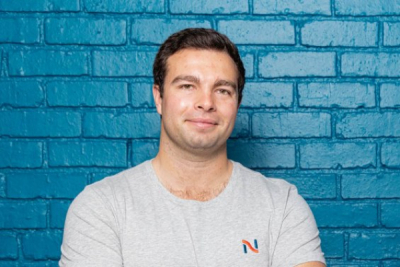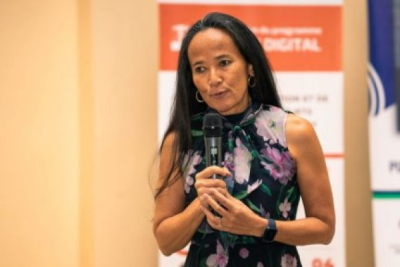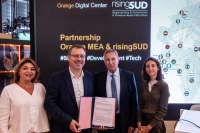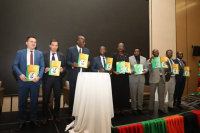Headed by Mayowa Akande and Bolaji Wahab, Vazzel aims to transform the fashion industry in Nigeria.
Vazzel is an online marketplace developed by a young Nigerian startup that allows fashion designers and vendors to launch their storefronts and showcase their collections. Customers on the platform can browse a wide selection of fashion products including textiles, bags, shoes, and accessories. Based in Lagos, the startup was founded in 2024 by Mayowa Akande and Bolaji Wahab.
“The market lacked a unified, tech-forward platform tailored for fashion vendors, especially in emerging markets, that also solves the prevalent issue of sizing in online fashion retail. [...] Vazzel differentiates itself through its AI sizing tool, local vendor focus, and simplified onboarding. This closes the gap between e-commerce infrastructure and body-personalized shopping experiences,” said Mayowa Akande in an interview with Disrupt Africa.
Although the platform does not yet have a mobile app, it offers a suite of “AI-inclusive” tools to streamline online store management, inventory tracking, customer engagement, and visibility on social media. The goal is to enable any stylist, designer, or fashion brand—even without technical expertise—to quickly bring their products online and reach a broader audience, both locally and internationally.
By integrating sales management, payments, and customer data, Vazzel functions as a one-stop shop for professionals in the fashion industry. The startup aims to expand into other African markets, with the ambition of nurturing a new generation of creators who can compete on a global stage. Its core mission is to connect African fashion with digital innovation while fostering local entrepreneurship.
By Adoni Conrad Quenum,
Editing by Feriol Bewa
VERA, a secure B2B communications platform, has partnered with cheqd, a payment infrastructure, to deliver verifiable digital identity and encrypted messaging for businesses across South Africa and beyond, it announced June 10.
The partnership kicks off with a beta launch of VERA’s platform on June 1st, 2025, tailored specifically for South African enterprises. A full minimum viable product (MVP) rollout is expected by the end of August.
This collaboration aims to build a verifiable identity ecosystem that empowers companies to communicate and transact with confidence—an increasingly critical need as cyber fraud and impersonation threats grow.
Through technological innovation, Egypt aims to enhance its appeal, improve the traveler experience, and support its economic ambitions by 2030.
Egypt is scheduled to launch the pilot phase of its new digital visa-on-arrival system in mid-June at Cairo International Airport. This initiative marks a significant step in the country's strategy to leverage digital technologies, modernize immigration procedures, and enhance its appeal as a tourist destination.
The system, designed to streamline the arrival process for international travelers, will utilize self-service kiosks installed in airport terminals and a dedicated mobile application. Visitors will be able to obtain an emergency visa within minutes through a fully digital process, incorporating QR codes and electronic payments. The new service aims to reduce queues, eliminate paperwork, and expedite border processing.
This initiative is part of Egypt’s National Sustainable Tourism Strategy 2030, which targets attracting 30 million tourists annually by 2028. As the country’s primary point of entry, Cairo Airport will serve as the testing ground for the program. Its success will determine if it expands to other hubs such as Sharm el-Sheikh, Hurghada, and Luxor.
Beyond improving the traveler experience, the program seeks to position Egypt alongside other destinations that have embraced digital transformation to boost their tourism sectors. The government also anticipates the new system will attract more foreign currency and strengthen a sector that contributes approximately 12% to the national GDP.
Initially, the system will cater to travelers from countries already eligible for Egypt’s e-visa program, particularly those in Europe, North America, and the Middle East.
By Samira Njoya,
Editing by Sèna D. B. de Sodji
In Africa, technology offers promising alternatives to the shortage of healthcare professionals. With the rise of healthtech, e-health solutions are proliferating across the continent.
Kera Health is a digital health solution developed by a Senegalese startup. It offers an AI-powered platform designed to connect stakeholders across the healthcare system in Senegal. Backed by the International Finance Corporation (IFC) since 2023, Kera Health was founded in 2022 by Moustapha Cissé, Papa Sow, and Hosam Mattar. In June 2025, the healthtech announced a successful $10 million funding round to strengthen its digital infrastructure, expand its services to more cities across Senegal, and prepare for regional rollout.
“We are thrilled about this partnership with IFC, whose commitment to digitizing healthcare in Africa aligns perfectly with ours. As Africa stands on the brink of a demographic explosion, leveraging technology in healthcare is not just an opportunity, it’s a necessity,” said Moustapha Cissé in 2023, at the time of the startup’s collaboration announcement with IFC.
Through its platform, Kera Health aims to improve care coordination, address the shortage of healthcare professionals, and enhance the safety and efficiency of the medical system. It centralizes health data—medical records, lab results, prescriptions, insurance coverage, and more—within a secure interface accessible to authorized professionals. This leads to fewer errors, improved continuity of care, and faster, more accurate diagnoses.
The solution harnesses AI algorithms to detect trends, automate certain types of monitoring, and support medical decision-making. It also adheres to the highest standards of data security. The startup's broader ambition is to make connected healthcare a reality for everyone, from downtown Dakar to the country’s most remote areas, before scaling to other countries in the region.
By Adoni Conrad Quenum,
Editing by Feriol Bewa
Drawing on his background as an investment banker in the financial sector, he shifted his focus to transforming the agricultural industry. His career path demonstrates a clear resolve to address economic challenges with practical solutions.
A finance expert and tech entrepreneur, South African Eugene Roodt (photo) has emerged as one of the key figures in the transformation of African agriculture. As co-founder of the startup Nile, he is betting on technology to bridge the gap between farmers and both regional and international markets, while improving their access to financing and agricultural inputs.
In 2020, alongside Louis de Kock and Rick Kleynhans, Roodt launched Nile.ag with the aim of removing the structural barriers that hinder agricultural trade across the continent. The platform operates as a digital marketplace, allowing farmers to sell their fresh produce directly to professional buyers. It integrates digital tools for managing logistics, traceability, quality control, and payments.
With a processing capacity of 2,500 tons of fresh produce per day, Nile now serves clients in 38 countries. It offers an alternative to traditional supply chains by cutting out middlemen, speeding up payments, and increasing transparency around pricing and product quality. The platform also includes a marketplace for agricultural inputs, helping farmers invest, grow, and gain independence.
On Tuesday, June 10, 2025, Nile announced a $11.3 million fundraising round to scale its impact and promote wider adoption of digital commerce among African farmers.
Eugene Roodt holds a bachelor’s degree in accounting and finance from Stellenbosch University, earned in 2013. Before venturing into entrepreneurship, he worked as an investment banker at J.P. Morgan between 2017 and 2020.
By Melchior Koba,
Editing by Sèna D. B. de Sodji
With her background, she has become a supportive mentor, dedicated to developing young talent and building an inclusive tech ecosystem.
Andréa Zafitody Li-Sai Chimento (photo) is a computer engineer who graduated from the National Institute of Applied Sciences in Lyon (INSA) in 1990. In 2019, she founded Zafy Tody, a tech startup incubator that stands out for its fully volunteer-based model.
Zafy Tody supports early-stage Malagasy startups without taking equity or ownership stakes, offering tailored guidance instead. Each year, the incubator selects between five and ten startups to join a six-month program known as the Seed Program. This initiative includes seed funding, access to workspace, hands-on workshops, and one-on-one mentorship.
The incubator has also built a training platform tailored to the needs of entrepreneurs and businesses undergoing digital transformation. Its modules cover UX/UI design, technological innovation, and entrepreneurship, with the aim of strengthening local capacity and fostering digital solutions adapted to Madagascar’s specific context.
Alongside her work at Zafy Tody, Zafitody Li-Sai Chimento plays a strategic advisory role within the African tech ecosystem. She serves as a senior advisor to the CEO of Axian Group—a leading digital player in Madagascar and across Africa—and sits on the advisory board of Novulis Consulting, a firm specializing in digital transformation.
She began as a solutions architect at IBM Global Services France, then joined Microsoft in 1997. Starting as a business services consultant in France, she moved on to managerial roles in Italy and later across Europe, the Middle East, and Africa. She oversaw enterprise services, led the Microsoft 4Afrika Academy in the region, and served as managing director in the Gulf.
In 2013, she joined Oracle in the Middle East as head of consulting services. In 2019, she moved to Amazon Web Services, where she has worked, among other roles, as head of enterprise business acceleration for Europe, the Middle East, and Africa.
By Melchior Koba,
Editing by Sèna D. B. de Sodji
Powered by a spirit of innovation, a new wave of African startups is setting its sights on international growth. In France, the southern region is emerging as a strategic hub and gateway, offering these companies a favorable environment in which to scale and gain global exposure.
Orange Africa and Middle East (OMEA) announced a partnership with risingSUD, the regional development agency for France's Provence-Alpes-Côte d’Azur (PACA) region, on Wednesday, June 11. The agreement, signed on the sidelines of the Viva Technology trade show in Paris, aims to support the establishment of African startups in France.
Jérôme Hénique, CEO of Orange Africa and Middle East, stated that the partnership with risingSUD is a crucial step in OMEA's ambition to promote African innovation globally. He added that the initiative extends the support Orange already provides to startups through its Orange Digital Centers. By facilitating their establishment and acceleration in France, especially in the southern region, Orange empowers young African companies to accelerate their growth.
The three-year partnership seeks to strengthen collaboration between the innovation ecosystems of Africa, the Middle East, and southern France. Startups within the Orange Digital Centers (ODC) network will receive tailored support to expand their operations in France. This support includes assistance with project development, access to funding, and networking opportunities with local economic partners.
The PACA region, which already hosts over 500,000 businesses, aims to solidify its position as a natural link between Europe and Africa. In 2024, risingSUD has already helped 14 African companies establish themselves in southern France. One such company is Guépard, a Tunisian startup incubated by the ODC in Tunis, which now has a presence in Marseille.
This partnership aligns with OMEA's ongoing efforts to champion African digital entrepreneurship. Operating in 17 countries across Africa and the Middle East, the ODC network provides free access to various services, including digital training, incubation, acceleration, and funding for innovative projects.
Ultimately, this collaboration is expected to strengthen economic and technological ties across the Mediterranean while simultaneously enhancing the global competitiveness of African innovation ecosystems.
By Samira Njoya,
Editing by Sèna D. B. de Sodji
The launch of the 2025 STI Policy marks a bold step toward transforming Zambia into a knowledge-driven economy, where innovation is central to development, competitiveness, and national resilience.
The Ministry of Technology and Science announced on June 5 that it has officially launched Zambia’s 2025 Science, Technology and Innovation (STI) Policy—an ambitious national strategy aimed at harnessing the power of innovation to position Zambia as a competitive player in the global economy. The policy outlines a transformative roadmap that aligns science, technology, and innovation with the country’s inclusive and sustainable development goals.
Speaking at the launch event, the Minister of Technology and Science, Hon. Felix Chipota Mutati, MP, emphasized that the policy reflects the government's commitment to using innovation as a tool for real economic transformation. “When President Hakainde Hichilema says we need to export one billion dollars’ worth of beef, it means we must improve cattle genetics, accelerate disease eradication, and apply science to scale up our productivity,” Mutati said. “Similarly, producing 10 billion tons of maize means translating research into practical agricultural outputs that put food on the table.”
Hon. Mutati highlighted that the policy comes at a time when global economies are being reshaped by cutting-edge technologies such as Artificial Intelligence, robotics, green energy, biotechnology, and space science.
The 2025 STI Policy rests on several strategic pillars. In the area of Research and Development (R&D), over K3 billion will be invested to strengthen Zambia’s national R&D ecosystem. This includes establishing national research priorities, upgrading scientific infrastructure, and creating a centralized database of ongoing research initiatives. Priority institutions will be empowered to carry out applied research aligned with Zambia’s economic and social goals.
For Artificial Intelligence and Emerging Technologies, the government has allocated K8 million to develop regulatory frameworks, ethical standards, educational programs, and awareness campaigns. These efforts aim to position Zambia as a regional hub for AI innovation.
The policy also introduces a robust framework for technology commercialization, which includes the creation of five new technology transfer offices, innovation hubs, and science parks. A national startup database and commercialization guidelines will support the growth and scaling of technology-driven enterprises across the country.
In terms of human capital development, the policy targets the training of at least 500 postgraduate students in STEM (Science, Technology, Engineering, and Mathematics) fields through scholarships, exchange programs, and mentorship. It also seeks to strengthen engagement with the Zambian diaspora and expand knowledge systems rooted in local traditions.
A major component of the policy is the preservation and development of indigenous knowledge systems. Legal frameworks and dedicated R&D centers will be established to protect and advance local innovations. The government also plans to increase Zambia’s Gross Expenditure on R&D (GERD) from the current 0.28% to 0.50% of GDP by 2029.
Zambia’s economy has long relied on commodity exports, particularly copper, which makes up around 70% of export earnings. The STI Policy provides a pathway to economic diversification, particularly in sectors such as agriculture, manufacturing, and healthcare, by supporting applied research, digital transformation, and technology commercialization.
Hikmatu Bilali
Meta has launched the Llama Impact Accelerator, a new program supporting startups across Sub-Saharan Africa to build open-source AI solutions that address local challenges in agriculture, healthcare, education, public services, financial inclusion, and security.
The six-week accelerator will run in Nigeria, Kenya, Senegal, and South Africa, offering equity-free funding, technical training, mentorship, and business support. The program is being implemented in collaboration with national innovation agencies and local ecosystem partners.
Each accelerator will culminate in a Demo Day, where teams present their Llama-powered solutions to a panel of local and international experts. Top teams will receive six months of extended support focused on product development, community building, and market expansion.
The Djiboutian government aims to position the country as a regional hub for AI innovation in the coming years. As part of this effort, a call for applications has been launched to recruit a national expert tasked with drafting the future national artificial intelligence strategy.
Djibouti's Ministry of Digital Economy and Innovation (MDENI), in partnership with the United Nations Economic and Social Commission for Western Asia (UNESCWA), announced on Sunday, June 8, the opening of applications for a National Artificial Intelligence Expert. This recruitment is a key step in developing the country's national AI strategy.
The chosen expert will be crucial in shaping the strategy by providing technical and analytical expertise. Their responsibilities include assessing Djibouti's current AI capabilities, identifying priority sectors for AI applications, holding consultations with local stakeholders, and crafting recommendations that align with international best practices.
This initiative highlights the government's goal to equip the country with a clear and structured AI strategy. The aim is to guide the development and ethical, inclusive, and secure use of AI across vital sectors. The upcoming national strategy must also address challenges related to education, research, data governance, and innovation.
The position is open to qualified Djiboutian specialists in artificial intelligence, digital policy, technological innovation, or information technology. Applications close on Monday, June 23.
By Samira Njoya,
Editing by Sèna D. B. de Sodji
More...
Ulysse Agassin and Two Friends Launched an Online Supermarket, Letting Diaspora Communities Place Orders for Delivery to Loved Ones in Africa
Mes Courses Béninoises, a Franco-Beninese startup, has launched an e-commerce platform allowing diaspora members to easily order essential food and household products for their families in Benin. Headquartered in Cotonou, Benin, and Montpellier, France, the company was founded in 2021 by Ulysse Agassin, who Vincent Ferrera and Enki Roussel later joined.
Agassin explained to We Are Tech Africa that the service was born from his own experience as a Beninese student in France. "Like thousands of expatriates, I send money to my family every month. But the money is often quickly spent," he said. "In Cotonou, my family struggled to withdraw it on time—no nearby withdrawal agency due to poor connectivity, agencies closed on weekends, and you had to wait until Monday, so there was no way to make urgent withdrawals on weekends."
Currently, users place orders via the Mes Courses Béninoises website. Once completed, purchases are delivered directly to recipients. For residents in Benin, orders can also be made through WhatsApp, phone call, or the Gozem app. The startup plans to develop a dedicated mobile app in the future.
In a significant expansion, Mes Courses Béninoises opened a physical supermarket in Cotonou in March 2024. It offers a wide range of products at affordable prices with a fixed delivery fee of 700 FCFA (approximately $1.22), with plans for free deliveries in the future. The startup reports serving over 2,000 customers from the diaspora.
In the short term, Mes Courses Béninoises aims to develop its own delivery fleet to reach all localities in Benin. The company is also pursuing regional expansion, having already launched Mes Courses Togolaises in Togo and planning to expand into Côte d'Ivoire soon. Additionally, the startup is developing a B2B model for corporate clients, offering group deliveries to employees via a dedicated platform.
By Adoni Conrad Quenum,
Editing by Feriol Bewa
Born and educated in the Democratic Republic of Congo, he turned to information technology early on. Today, he develops digital solutions tailored to local economic realities.
Yannick Zagabe (photo), a Congolese computer scientist and tech entrepreneur, is the CEO and head of artificial intelligence at Netikash. His startup's mission is to "contribute to building a digital economy in the Democratic Republic of Congo and across Central Africa."
Founded in 2017, Netikash is a fintech company that provides digital tools for businesses to manage their commercial and financial operations. Its main product, Netikash Pay, is a digital wallet allowing users to transfer money, make online purchases, and combine multiple mobile money accounts into one interface.
The company also developed Netikash Payme, a service for online sales that enables users to create custom payment pages to generate income. For businesses with subscription models, Netikash Subscribe simplifies subscription management and allows companies to create shareable dedicated pages for recurring revenue.
Netikash POS, the startup's newest innovation, transforms a smartphone into a smart payment terminal compatible with various digital wallets.
Zagabe earned a Bachelor's degree in Information Technology from the Protestant University of Lubumbashi in 2012. He completed a business and entrepreneurship program at Skyline College in the United States in 2017.
Before his current role, he worked as a network engineer at Minerals and Metals Group, a mining sector company, from 2010 to 2016.
By Melchior Koba,
Editing by Sèna D. B. de Sodji
After being torn between two continents, he decided to launch his startup in his home country, Côte d'Ivoire. Through his company, he promotes African artisanal products.
Zaza Gnahoré moved to Belgium at age 14 to join his family. After several years there, he decided in 2019 to return to his native Côte d'Ivoire. A year later, he launched Djoloo, an e-commerce platform dedicated to showcasing African cultural creations.
Djoloo functions as both a display and a conduit, operating as a marketplace that enables African artisans to sell their products—including clothing, home decor, jewelry, and cosmetics—to a global customer base. Creators directly manage their own storefronts and handle product shipping, enhancing their independence and market visibility.
The platform supports multiple currencies, such as the euro, U.S. dollar, CFA franc, Swiss franc, yuan, and British pound, facilitating global market access for artisans often excluded from traditional distribution channels.
"My goal with this project is to highlight African culture, integrate it into everyday experiences, and create employment opportunities," Gnahoré said.
Beyond its e-commerce function, Djoloo also features editorial content. An integrated blog spotlights the inspiring journeys of African creators and shares success stories from partner brands. This storytelling approach aims to foster a community centered on the continent's creative spirit.
Gnahoré studied photography and cinematography at the INRACI Technical and Artistic Secondary School in Brussels from 2010 to 2011. Before his return to Côte d'Ivoire, he worked in 2013 as a video editor and colorist for Lire et Écrire, a continuing education initiative focused on promoting literacy in French-speaking Belgium.
By Melchior Koba,
Editing by Sèna D. B. de Sodji
The United Nations regards the Internet as a fundamental service, on par with electricity and clean drinking water. Aware of its role in Africa’s economic and social development, a call for widespread mobilization has been issued to boost investment.
Africa's internet penetration is growing at twice the global average, according to the International Telecommunication Union (ITU). Since 2005, the continent has seen an average annual growth rate of 16.7%, compared to the global average of 8%. Although this pace has slowed over the past decade to 10.7% annually versus 6.1% worldwide, Africa continues its sustained digital expansion. This rapid growth underscores a strong desire for digital integration, despite persistent deep divides compared to the rest of the world.
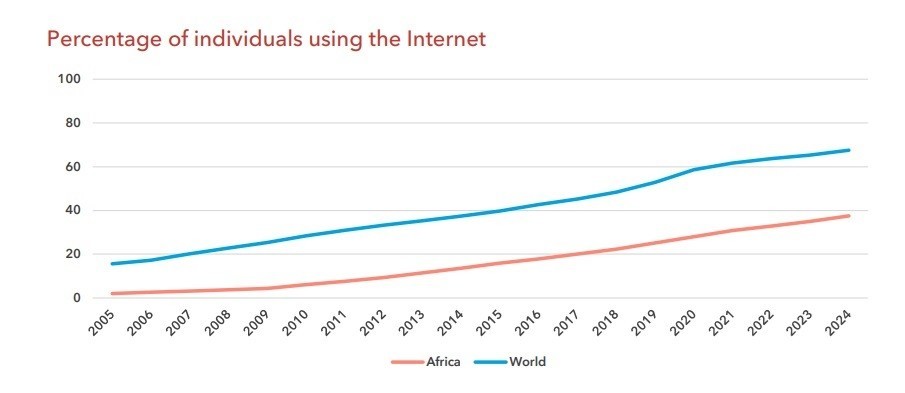
Source: ITU
In 2024, only 38% of the African population was connected to the internet, significantly less than the global average of 68%. This makes Africa the least connected region globally, emphasizing the structural and economic hurdles many African countries must overcome to ensure widespread and equitable access to digital technologies.
Gender Disparity
A notable inequality in Africa is the digital gender divide. In 2024, 43% of men used the internet compared to only 31% of women. This imbalance results in a Gender Parity Score (GPS) of 0.72, well below the global average of 0.94.
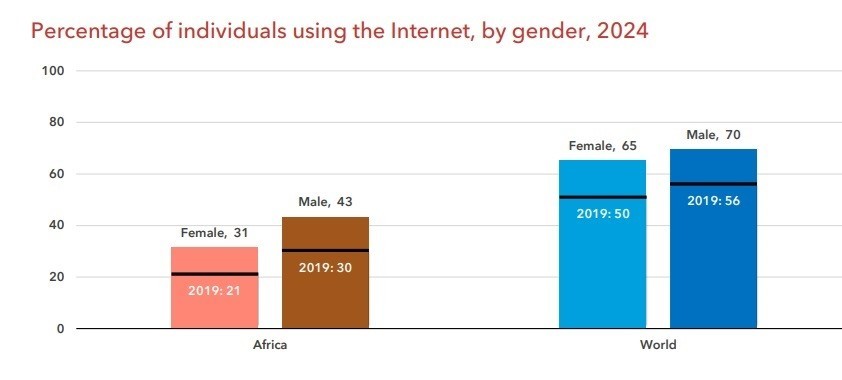
Source: ITU
While this trend shows improvement—the GPS has risen from 0.69 to 0.72 over the past five years—it remains insufficient to quickly reverse the structural underrepresentation of women in the digital sphere.
Age Divide
The digital divide in Africa also extends to generations. In 2024, 53% of young Africans aged 15 to 24 were connected to the internet, compared to 34% of the older population.
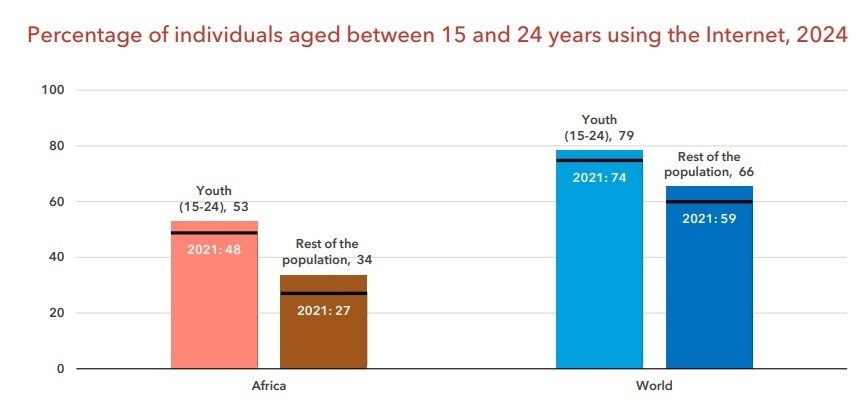
Source: ITU
This generational gap is more pronounced than the global average, though it is slowly narrowing. The ITU views young people's embrace of digital tools as a major asset for the continent's digital transformation. However, it also highlights the urgent need to expand access to older and marginalized populations to achieve truly universal digital inclusion.
Geographic Disparities
Internet connection distribution also reveals significant geographical fragmentation. In 2024, 57% of urban residents in Africa used the internet, whereas only 23% in rural areas had access. This 34-percentage point gap is comparable to the global average gap of about 35 points between urban (83%) and rural (48%) environments.
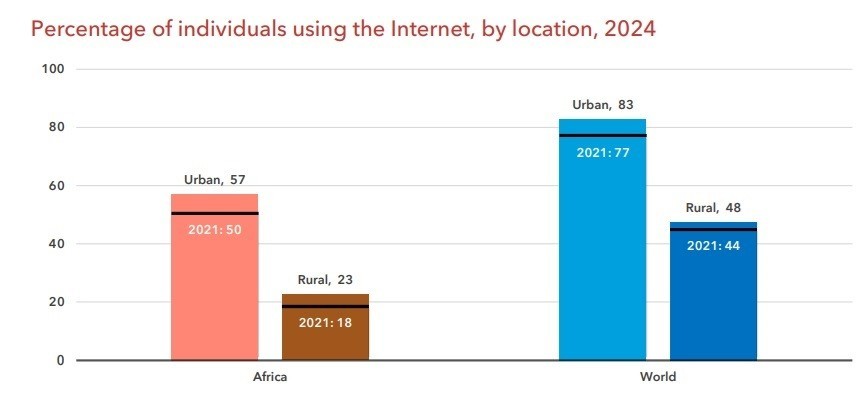
Source: ITU
Data from several African countries indicates a clear trend: higher overall internet penetration rates tend to correlate with smaller gaps between rural and urban areas. This suggests that targeted and sustained progress in infrastructure and public policy can reduce geographical inequalities.
A Call to Action
Given these pervasive disparities, it is clear that Africa cannot bridge its digital divide without collective and coordinated action. Investing in infrastructure, especially in rural and remote areas, is crucial for more equitable access to digital tools. Similarly, inclusive public policies that consider gender, age, and location must be systematically implemented to foster a fairer digital society.
Governments, telecom operators, NGOs, and development partners play a fundamental role in addressing the continent's many digital divides. While Africa continues to demonstrate above-average growth in internet access, this momentum requires structural measures to ensure it benefits all segments of the population without exception. In an increasingly digital world, digital exclusion equates to a form of social marginalization. Therefore, accelerating efforts for digital inclusion at all levels is imperative for Africa to fully capitalize on the opportunities presented by digital transformation.
Muriel EDJO






